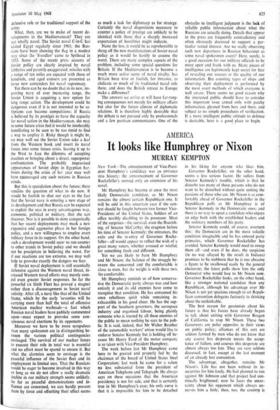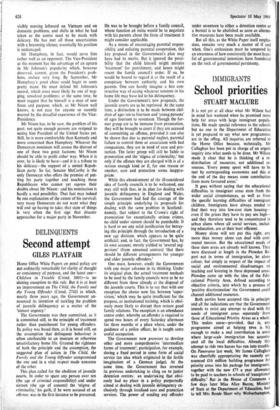It looks like Humphrey or Nixon
AMERICA MURRAY KEMPTON
New York—The announcement of Vice-Presi- dent Humphrey's candidacy was an entrance into history; the announcement of Governor Rockefeller's seemed only an extension of his novel.
Mr Humphrey has become at once the most likely Democratic candidate, as Mr Nixon remains the almost -certain Republican one. It will be odd in this uncertain year if the con- test should be fought between two former Vice- Presidents of the United States, holders of an office terribly disabling to its possessor. Most of the surprises—the survival, even the flourish- ing, of Senator McCarthy; the eruption before his time of Senator Kennedy; the entrances, the exits and the re-entry of Governor Rocke- feller—all would appear to reflect the wish of a great many voters, whether aroused or wistful, for something fresh and different.
Yet we are likely to have Mr Humphrey and Mr Nixon; the balance of the struggle be- tween the concerned and the comfortable is close to even, but the weight is with these two, the comfortable.
Mr Humphrey reminds us of‘ how conserva- tive the Democratic party always was and how entirely it and its old enemies have come to recognise that condition. He has consumed his once rebellious spirit while remaining in- exhaustible in his good cheer. He has the sup- port of the Southern governors, the aerospace industry and organised labour, being plainly someone who is trusted by all these enemies of the public to mean nothing he says to the pub- lic. It is said, indeed, that Mr Walter Reuther of the automobile workers' union would like to endorse Senator Kennedy but is holding off be- cause Mr Henry Ford of the motor company is so taken with Vice-President Humphrey.
The week before last Mr Humphrey came here to be greeted and properly fed by the chairman of the board of United States Steel Corporation; last week he came for a salute no less substantial from the president of American Telephone and Telegraph. He always says on these occasions that the American presidency is not for sale, and that is certainly true in Mr Humphrey's case; his only curse is that it is impossible for him to be detached
in his liking for anyone who likes him.
Governor Rockefeller, on the other hand, seems a less serious factor. He suffers from Senator Kennedy's trouble, which is that he disturbs too many of those pelsons who do not want to be disturbed without quite uniting the passions of those who are. Mr Nixon is as com- fortably ahead of Governor Rockefeller in the Republican polls as Mr Humphrey is of Senator Kennedy in the Democratic ones; and there is no way to upset a candidate who enjoys an edge both with the established leaders and the ordinary members of his party.
Senator Kennedy could, of course, overturn this : the Democrats are in the most volatile condition imaginable and he has entered party primaries, which Governor Rockefeller has avoided. Senator Kennedy would need to sweep them all—and even if he does, the suspicion (in no way allayed by the result in Indiana) promises to be stubborn that he is too abrasive a figure to be swallowed easily by the general electorate; the latest polls show him the only Democrat who would lose to Mr Nixon now. Governor Rockefeller looks, on the other hand, like a stronger national candidate than any Republican, although his advantage over Mr Nixon is not yet spacious enough to set Repub- lican convention delegates furiously to thinking about the unthinkable.
The best reason for pessimism about his future is that his forces have already begun to talk about uniting with Governor Reagan of California to stop Mr Nixon. These two Governors are polar opposites in their views on public policy; alliances of this sort are seldom formed by men who do not know that any course less desperate means the accep- tance of failure, and courses this desperate are almost always too late. They are very seldom discussed, in fact, except at the last moment of an already lost convention.
The advantage, altogether, remains Mr Nixon's. Life has not been without its in- securities for him lately. He had planned to run against Mr Johnson and that project had con- tinually brightened; now he faces the uncer- tainty about his opponent which always un- nerves him a little; then, too, the country is
visibly moving leftward on Vietnam and on domestic problems, and shifts in what he had taken as the centre need to be made with delicacy. He has met all those uncertainties with a becoming silence; essentially his position is undamaged.
Mr Humphrey, in fact, would serve him rather well as an opponent. The Vice-President at the moment has the advantage of an upturn in Mr Johnson's popularity which, however deserved, cannot, given the President's prob- lems, endure very long. By September, Mr Humphrey's good cheer could begin to seem pretty inane. He must defend Mr Johnson's record, which must most likely be one of nag- ging, unsolved problems; at the same time, he must suggest that he himself is a man of new force and purpose, which, as Mr Nixon well knows, is not easy for anyone so recently marred by the dreadful experience of the Vice- Presidency.
Mr Nixon has, to be sure, the problem of his past; not quite enough persons are resigned to seeing him President of the United States yet. Still, he is more comfortable than Kennedy and more concerned than Humphrey. Whoever the Democrats nominate will arouse the distrust of one of these two great factions; Mr Nixon should be able to profit either way. When it is over, he is likely to have—and it is a tribute to his delicacy—the support of a united Repub- lican party. So far, Senator McCarthy is the only Democrat who offers the promise of put- ting his party together and touching those Republicans who cannot yet repress their doubts about Mr Nixon: and his nomination is hardly a real possibility. That fact may indeed be one explanation of the extent of his survival; very many Democrats do not want what they will end up having to take; that state of things is very often the first sign that disaster approaches for a major party in November.







































 Previous page
Previous page